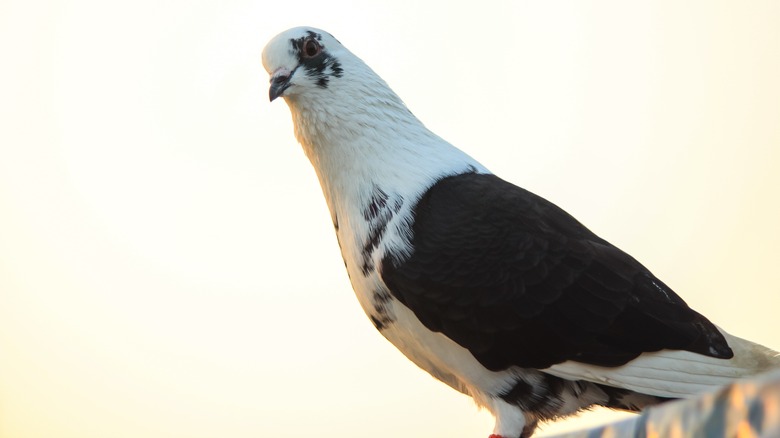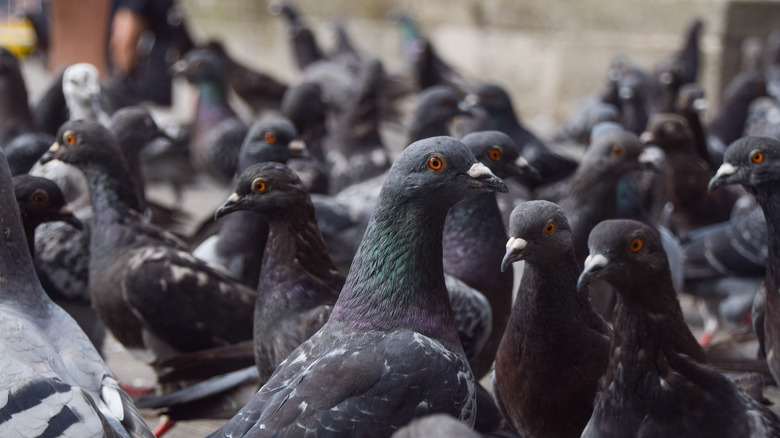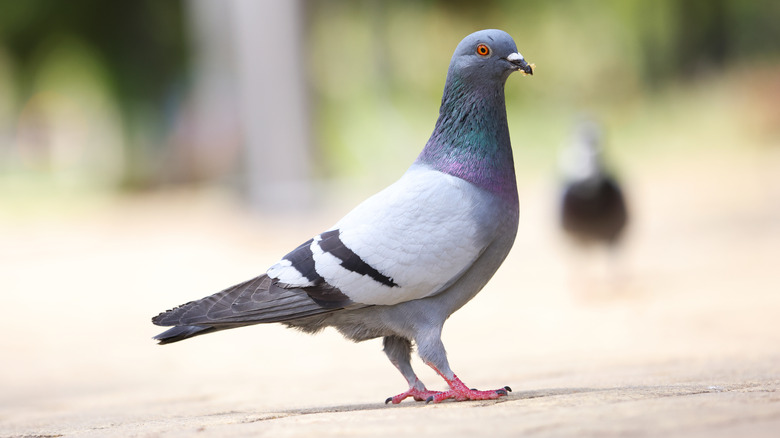What We Know About The Virus That Turns Pigeons Into 'Zombies'
In countries including the United Kingdom, pigeon populations have been struck with a disease called pigeon paramyxovirus, or PPMV (via News18). This illness causes such bizarre and severe symptoms in afflicted pigeons that many people have said it's like the pigeons have become "zombies."
Good news for us humans, though — they're not actually undead, though they might appear to be. Infected pigeons show no aggression towards humans, but PPMV causes many other notable symptoms, including a twisted neck. Other obvious physical changes arise, too, including shaking wings and partial paralysis of the pigeon's lower body, which might make them move strangely or even fall over when attempting to walk (via The Weather Channel).
If that wasn't enough, birds also experience more standard symptoms of sickness, like fatigue and a lack of hunger. And — in a bit of a TMI turn — their feces can turn green and be a little bit on the runny side.
Can pigeons survive the zombie disease?
PMVV is very deadly for pigeons, according to The Weather Channel. Almost all pigeons who are afflicted with the disease die. Even the survivors are unlikely to escape unscathed: in addition to the potential of experiencing severe long-term damage, like a permanently twisted neck (via News18), surviving birds are sometimes euthanized because they can pass on the disease to healthy animals, according to The Economic Times.
In general, PMVV is considered highly infectious, spreading between birds that have contact with each other, each other's feces, or a shared food source. That means it doesn't take long for a single sick bird to cause a major outbreak — especially since there's no specific vaccine designed for PMVV, though some vaccines created for other diseases may work.
Like human influenza, PMVV is more likely to strike during cold weather, so outbreaks in the fall and winter aren't uncommon. In fact, though this disease is in the news at the moment because of its UK outbreak — which has already spread to dozens of locations and has led to the death of 3 million birds, per Times Now News — outbreaks have occurred many times in the past in many different regions.
Can humans get PMVV?
So can PMVV spread to humans? Yes — but that doesn't mean you need to prep your zombie survival kit just yet. It's not very common for the sickness to spread from birds to human handlers, according to The Weather Channel, and even when it does, it manifests in people in a completely different manner than it does in birds. For instance, humans don't experience a cocked head, paralysis, or any other alarming symptoms. Instead, PMVV in people causes an illness that is more akin to a mild flu.
However, PMVV can spread to some other birds, including doves, chickens, and turkeys, according to The Economic Times. That means you might want to be on the lookout for affected pigeons if you've got your own chicken coop.
Other species might not be vulnerable to PPMV, but they can have their own zombie-type diseases. For example, deer, elk, and other ruminants can fall victim to something called chronic wasting disease (via ABC News). Unlike PPMV, chronic wasting disease isn't the result of an infection, but instead, it arises from the misbehavior of particles called prions in the brain. Completely incurable and highly contagious, chronic wasting disease turns deer into shadows of their former selves, causing them to behave in strange and irregular ways, including being aggressive toward humans. For this reason, the disease is sometimes dubbed "zombie deer disease."


